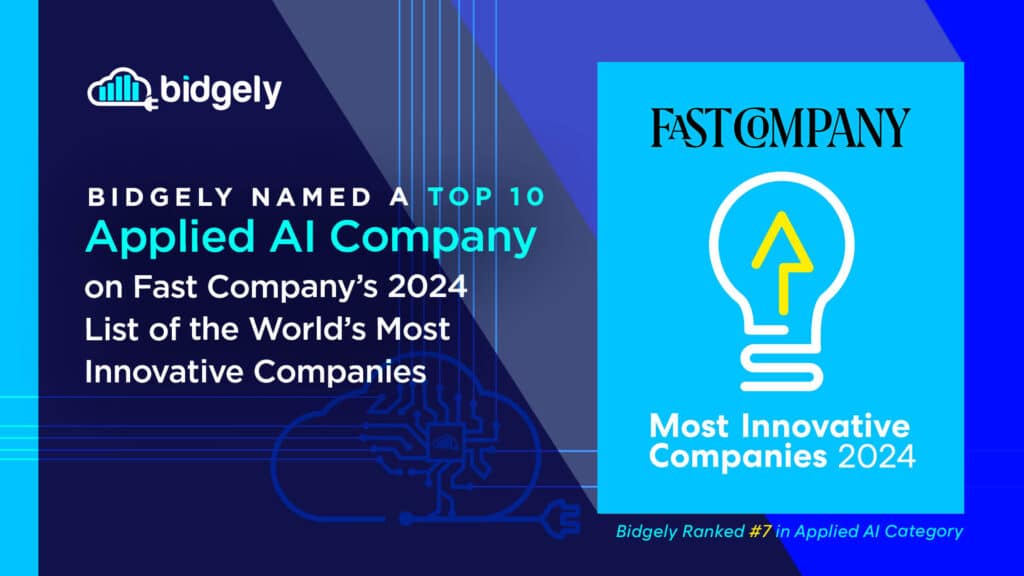Bidgely Named No. 7 Applied AI Company on Fast Company’s 2024 World’s Most Innovative Companies
Bidgely has achieved a significant milestone by being named to Fast Company’s esteemed list of the World’s Most Innovative Companies of 2024, securing the 7th position in the Applied AI category. This recognition is a testament to Bidgely’s pioneering efforts in leveraging artificial intelligence to revolutionize the energy sector. The honor underscores the company’s commitment to innovation and its role in driving forward the digital transformation of utilities with AI-powered solutions. Being included in this year’s list highlights not only Bidgely’s innovative edge but also its contribution to shaping industry trends and pushing the boundaries of what is possible in technology and business.

“As the energy transformation evolves, Bidgely’s applied AI technology ubiquitously addresses utility use cases – including managing the influx of electric vehicles (EV), solar adoption, decarbonizing the grid, and much more,” said Abhay Gupta, CEO of Bidgely. “This honor is shared with the entire Bidgely team, which works to innovate solutions to pressing issues like grid stability, reducing energy-related carbon emissions, and saving customers money on energy.”
Bidgely’s UtilityAI™ Platform is at the heart of its innovative approach, transforming the data collected from smart meters into personalized energy profiles for each household and business. This advanced analytics platform leverages artificial intelligence to dissect billions of data points, enabling a granular understanding of energy consumption patterns. By turning raw data into actionable insights, Bidgely empowers utilities to optimize the existing grid infrastructure more efficiently and cost-effectively. Furthermore, it places the power of information into consumers’ hands, allowing them to make informed decisions about their energy usage, ultimately leading to increased efficiency and savings. This breakthrough technology exemplifies how Bidgely is redefining the energy industry’s landscape, making it both smarter and more sustainable.
Last year’s introduction of Bidgely’s “8760 Energy Model” marked a significant milestone in the company’s innovative saga, earning specific commendation from Fast Company. This revolutionary model provides a comprehensive, hour-by-hour analysis (totaling 8760 hours in a year) of energy consumption, offering unprecedented granularity in understanding how individual customer load profiles contribute to overall grid dynamics. It’s a groundbreaking approach to grid planning, electric vehicle (EV) analytics, and the exploration of non-wire alternatives and accurate load forecasting. With this model, utilities gain a powerful tool for identifying consumption trends, predicting future grid behaviors, and fostering consumer actions that support grid stability. It also plays a crucial role in assessing the impact of individual and collective energy usage on critical grid assets, thereby enabling a more proactive and less reactive approach to grid management. This innovative leap forward demonstrates Bidgely’s commitment to not just advancing the energy sector through technology but also to aiding utilities in their transition to a smarter, more sustainable future.
The addition of EV Managed Charging to Bidgely’s award-winning end-to-end EV Solution further illustrates the company’s innovative approach to energy management. This feature allows utilities to directly control electric vehicle (EV) charging, ensuring that charging occurs during periods of low carbon footprint, low cost, and low grid constraint. This aligns with the broader goal of optimizing energy usage while minimizing environmental impact. In a significant milestone reached in 2023, Bidgely surpassed 1 Terawatt-hour (TWh) of energy savings for its global customers, translating to the avoidance of approximately 700,000 metric tons of CO2 emissions. This achievement is a testament to the effectiveness of Bidgely’s intelligent energy efficiency programs, demonstrating a significant contribution towards reducing global carbon emissions and promoting a more sustainable future.
